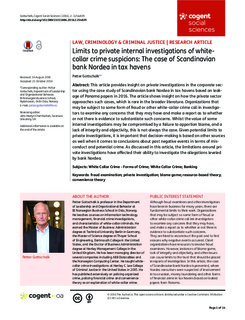Limits to private internal investigations of white-collar crime suspicions: The case of Scandinavian bank Nordea in tax havens
Journal article, Peer reviewed
Published version

View/
Date
2016Metadata
Show full item recordCollections
- Scientific articles [2181]
Abstract
This article provides insight on private investigations in the corporate sector using the case study of Scandinavian bank Nordea in tax havens based on leakage of Panama papers in 2016. The article shows insight on how the private sector approaches such cases, which is rare in the broader literature. Organizations that may be subject to some form of fraud or other white-collar crime call in investigators to examine any concerns that they may have and make a report as to whether or not there is evidence to substantiate such concerns. Whilst the value of some internal investigations may be compromised by a failure to apportion blame, and a lack of integrity and objectivity, this is not always the case. Given potential limits to private investigations, it is important that decision-making is based on other sources as well when it comes to conclusions about past negative events in terms of misconduct and potential crime. As discussed in this article, the limitations around private investigations have affected their ability to investigate the allegations leveled by bank Nordea.
Keywordsfraud examinationprivate investigationblame gameresource-based theoryconvenience theory
Description
Original version as published in the journal. CC-By